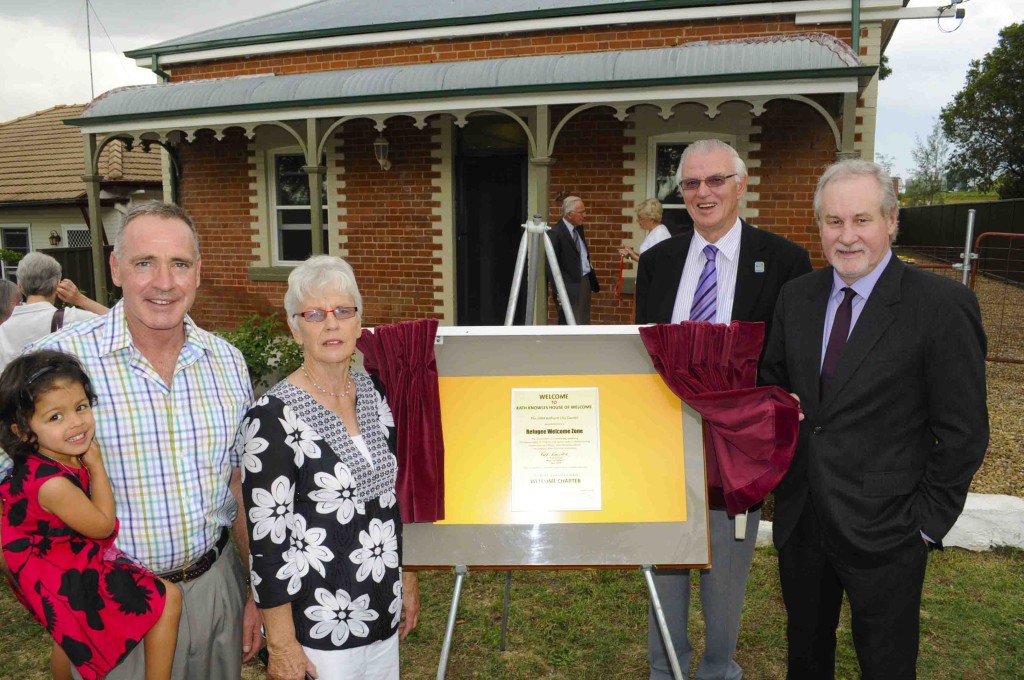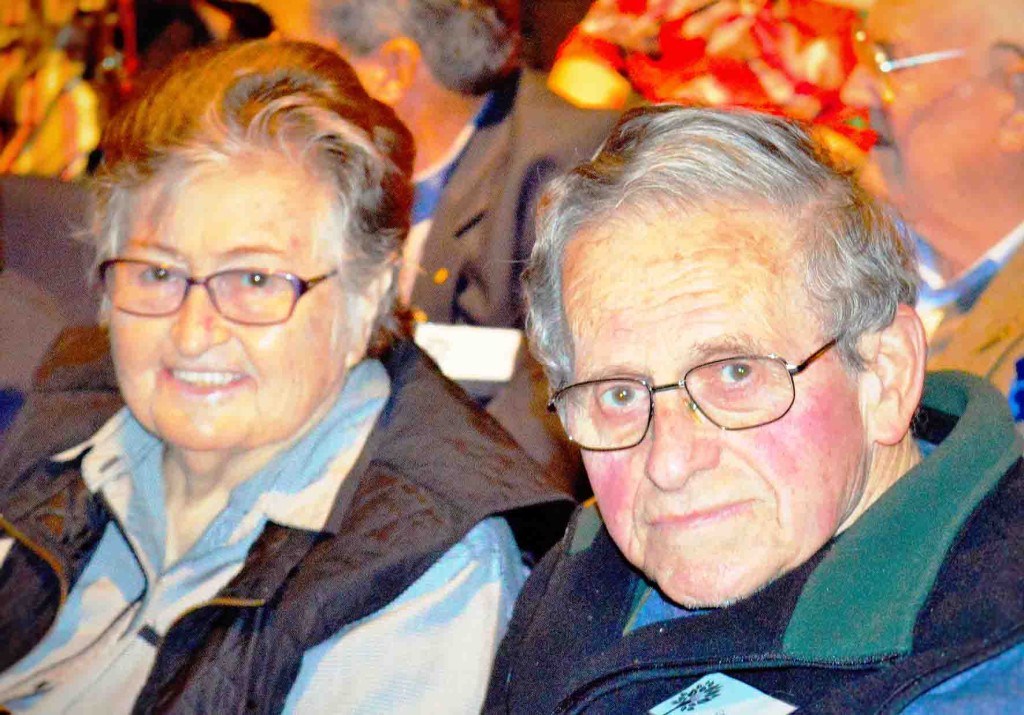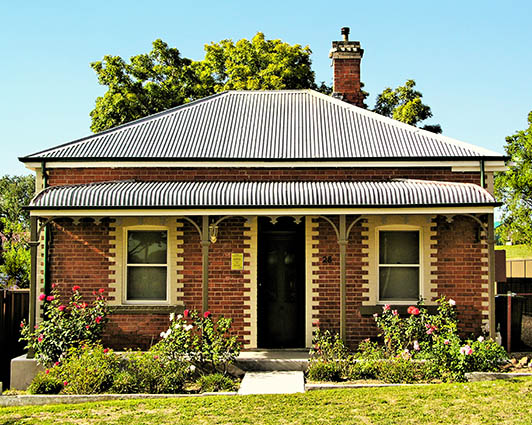History of House of Welcome 2011-2023
The Kath Knowles House of Welcome closed in November 2023. Below is some information about its inception and life.
Kath Knowles House of Welcome
In February 2011 the Sisters of Mercy leased a cottage at 28 Busby Street to the Bathurst Refugee Support Group to be used for welcoming refugees to Bathurst for short term stays. It was very old and needed some work done on it but it allowed some refugee groups to enjoy happy visits to our City. Besides affording the refugees with some respite from their lives in Sydney and enabling them to see something of Australia outside of the big city, it also gave citizens of Bathurst an opportunity to meet and get to know refugees as real people and not as the “demons” sometimes portrayed by the media.
The cottage was named in honour of a former Mayor of Bathurst, Kath Knowles, who was responsible for the City becoming a signatory to The Refugee Council of Australia’s Welcome Zone in 2002.
In 2014 the cottage was unavailable for use while the Institute of the Sisters of Mercy of Australia and Papua New Guinea totally refurbished and extended it at considerable cost and re-leased it to BRSG for a “pepper corn” rent.
It was reopened by Phil Glendenning, President of the Refugee Council of Australia when he visited Bathurst on 10 December 2014. In 2015, 72 people stayed at the House of Welcome. The cultural groups represented were: Pakistani, Hazara, Iraqi, Karen, Hashin and Sudanese.

From left to right: Paul McCrohan (Kath Knowles’ husband, holding Adithi Kathryn Ambikapathy Knowles), Sue Knowles (Kath Knowles’ mother), Brian Mowbray (chair of Bathurst Refugee Support Group), and Phil Glendenning. Photo: courtesy of Western Advocate
Click the image above to download a copy of a Letter of Thanks from Marist Youth Care
Policies
House Of Welcome Child Protection Policy
History up to 2010

The group was established as a Community Refugee Settlement Scheme (CRSS) Group on December 2nd 1998 by Fr John Clarkson. Twenty people attended the first meeting. At that meeting, Mrs Mary Hanoun-Killa, the full time refugee worker of the NSW Ecumenical Council, outlined the way in which the Council could assist the group in accessing government financial help to set up a support group and assist refugees. The meeting got good coverage and it was agreed to start off by providing toiletries, underwear and phone cards for detainees. There was a successful appeal in the churches over Christmas.
1999
In April a training seminar was held. Mrs Hanoun-Killa conducted it with two other speakers, one from the Asylum Seekers Centre in Sydney and the other one from STARTTS (Service for the Treatment & Rehabilitation of Torture and Trauma Survivors) on the effects of torture. This equipped enough supporters to settle a family in Bathurst. While waiting to settle a family it was decided to attend to short term care of the asylum seekers, give financial assistance to organisations such as the Asylum Seekers Centre and to provide Community Education with regard to the plight of refugees.
In September, in conjunction with the Mayor of Bathurst, the group organised an appeal for the East Timorese. At the end of September, the group was asked to give hospitality to a Refugee woman and her two sons. They stayed with the Sisters of Mercy in Keppel Street.
The October meeting welcomed refugees from Bosnia, Vietnam and Iraq and the group included two Muslims. So what started as an Inter-church Christian group extended its membership to all those in the community concerned for the care of refugees.
2000
A dinner, with a raffle, was organised in June to raise funds and to raise awareness of the sufferings of refugees and what could be done to assist them. 100 people attended and members of the committee spoke of their work. The main speaker was Merzuka Nancarrow, a nursing sister from Kosovo.
During Refugee Week in August an annual refugee service in one of the Bathurst churches was commenced. Bishop Doherty preached the sermon at the first one at All Saints Cathedral. There was also a guest speaker, a man who had survived the Rwanda genocide of 1994.
There were three other events during that week too. The first was at the art gallery where Susan Harris, a lawyer, and Bruce Haigh, a diplomat, spoke: Susan on her advocacy work for asylum seekers; Bruce, on the Government’s policy of deterrence. The second event was a school competition organised by Angie Trevor-Jones, with 37 posters being produced. The third event was a film night at the Metro, the film being “Billy Eliot”, with the proceeds totalling $1300. Besides raising funds these events were directed to community education.
In September, the then Refugee Worker, Pat Dunn, from the Ecumenical Council sent an Iraqi woman and her daughter to Bathurst for respite. Her husband had been taken away by the police in Baghdad. They had been warned that, because her husband was a political activist, that they were under threat. Her family in Iraq obtained false papers for her enabling her to leave quickly by night. She was taken into Turkey and put on a flight to Australia. She felt not wanted here as she and her daughter spent two months in the Villawood Detention Centre and then were released into a Sydney street with only enough money for two nights. Pat Dunn was asked to look after her. Fr John wrote to the Advocate outlining her history and pointed out that the Government’s asylum seeker policy was so cruel. This Iraqi woman tested the understanding and communicating skills of the group. She seemed a reluctant visitor to Bathurst, but the members learnt to respect her desire for privacy. After she and her daughter returned to Sydney, BRSG helped to pay her rent.
But the biggest challenge of the year was welcoming a journalist from Bangladesh, who was also a political activist. He was recommended by the Ecumenical Council and had worked for Amnesty International. He stayed for four days and made it his business to be very critical of the government! Bill Gates, one of the members, arranged for him to give an address at Charles Sturt University and for him to meet members of the media. BRSG were grateful to Sister Pat Linnane for giving him hospitality.
During 2000 Fr John Clarkson produced two newsletters to assist in promoting the work of the group. It was distributed to churches and community groups.
2001
In March the Group was asked to resettle a Somali woman and her family. A house was found and basic requirements were provided. In the first week she was assisted to open a bank account, was accompanied to Centrelink and the Housing Commission and helped to get the children into school. From this experience the Group and a local State Member tried to get funds for A House of Welcome in Bathurst but finance was not forthcoming. This was a pity because finding casual accommodation for needy refugees is difficult.
This year saw the lead-up to a Federal election, and it was a time of scare-mongering by the Government regarding asylum seekers being unwanted because they forced themselves upon us. Again, in October Fr John wrote a letter to the Western Advocate giving a contrary view.
2002
A family, Assyrian Christians from northern Iraq, were resettled by the Group. It turned out that BRSG was one of the last CRSS groups to assist a family like this before the Government changed its policy and introduced a tendering process whereby by firms and large organisations took over the resettlement process. It was a great shame as the CRSS process had great educative value for the community as well as the family concerned. Also, the so-called “Pacific Solution” was introduced and Fr John, on behalf of the Group, wrote to a number of politicians condemning it. He also continued to produce Newsletters.
In June another dinner was organised. The speaker was Sister Margaret Moore who described Mercy ministry in refugee camps. That year the refugee Church service was held in the Uniting Church with Dr Sharon Pickering of CSU speaking on human rights.
Towards the end of the year Sister Lorraine Phelan, Ecumenical Council refugee worker, came to speak about her work in community education and visiting Villawood Detention Centre.
In December a successful reverse Christmas tree was held which involved a large number of supporters bringing 300 wrapped gifts and $1000 for phone cards for detainees, especially children. There was a raffle of $1200 for hospitality needs. There were two speakers: Matthew Beckham, a Franciscan lawyer, and Julie Morgan. Their subject was the “Just War”. During the year also another film evening and raffle was held to raise funds.
2003
In January, there were riots at Villawood Detention Centre, creating an aggressive public opinion climate against asylum seekers. Fr John once again wrote a letter to the Western Advocate, and in January 3rd ‘s edition there was a front page article with his photograph.
The editor of the Western Advocate, in responding to these riots, wrote in his leader article: “In the past, refugees from conflicts which we cannot hope to appreciate have settled peacefully in Bathurst and surrounding towns. It would be a tragedy if the isolated events of recent days were to undermine efforts the city should be proud of.”
In February Sister Lorraine Phelan, Refugee Worker, attended the annual meeting when 25 attended from churches and community groups. Sister said, “The group has been doing a lot of work dedicated to the settlement of refugees and to raising awareness around Bathurst.” The gifts from the Christmas tree provided every detainee with a gift.
In August the refugee church service was held at All Saints Cathedral. Children representing different countries processed bearing flags. It was very moving.
At the September meeting a One Year Strategic Plan was presented for discussion. The question was posed: Where do our priorities lie in relation to the strength of our support? Respite care would be a challenge if there were to be no House of Welcome. Education of the community at large would be vital if negative perceptions were to be overcome. The Group needed to continue to organise a Refugee Sunday Church Service and the reverse Christmas tree project and activities connected with procurement of funding. At some stage a leaflet which was used for publicity purposes amongst churches, community organisations, etc. was produced.
In May Sister Pat Linnane, who was the Co-ordinator of BRSG at the time, negotiated with the Bathurst Regional Council to have the City of Bathurst declared a city of Welcome. Fr John continued his important educative role.
2005
This year the Honourable David Tonge (a retired judge from the Family Court) took over the Chair. Apart from supporting the African lady, $1500 was sent to each of the following organisations – the NSW [Refugee] Council, Mercy Works [of the Sisters of Mercy] and the Asylum Seekers Centre to support their work. It was decided to hold the annual reverse Christmas Tree as a “Christmas in July” event to avoid the end of year rush. The Refugee Week Church Service was organised by Steve Howes, Brian Mowbray, and Bill Gates. It was held at the Baptist Church, and Niall McKay from the Uniting Church was the speaker.
2006
David Tonge’s influence as a committed supporter of the cause was able to raise the level of awareness in the Community through the local press, community groups and radio stations throughout this year.
In July the reverse Christmas tree took place in the hall facilities of St Stanislaus College, having been very capably organised by the school chaplain, Fr D. Akehurst, a member of BRGS. John Highfield, a journalist for The World Today programme on ABC Radio, and his wife were the speakers. Rev Karyn Burchell was the speaker at the Refugee Church Service at the Uniting Church. About 400 persons attended. A bush dance was held for the second year running, with the Nodding Thistles Band donating their music.
In October a group of Bathurst people attended the 5th anniversary of the SIEV X Memorial Ceremony to honour the 353 parents and children who were drowned trying to reach Australia. Three hundred decorated timber poles created by students in 200 schools including St Stanislaus College were to be erected until the Federal ACT Commission stopped it. The poles were in remembrance of each person drowned. The group made a contribution of $100 to a permanent memorial.
Fr John’s account finished in March 2007 and what follows has been pieced together from minutes and reports:
2007 – 2010
In March 2007, David Tonge presented a first draft Discussion Paper re a Bathurst Region Refugee Relocation. In his brief annual report to the next AGM David Tonge reported that 2007 had been a quiet year for the group.
In June 2008 there was a visit of 17 Karen refugees sponsored by STARTTS to Bathurst.
On 14 August, another film night was held. Sadly, on the night of the film event David Tonge died at this home, while waiting to go to the cinema to present raffle prizes.
In November there was an awareness-raising Dinner at the Bathurst Conference Centre at which the Director of the Edmund Rice Centre spoke.
In 1 June 2009 BRSG was incorporated as an Association.
13 – 15 May a group of senior Bosnian men and women was hosted in Bathurst and on 30 May a training day was conducted for members of BRSG by STARTTS re the trauma suffered by refugees having to flee their homes and the difficulties they face settling into a new community and culture.
On 13 July another successful film night was held.
On 19 June 2010 BRSG received an Humanitarian Award from Refugee Council of Australia and STARTTS for their advocacy and policy work and for the great welcome all communities receive when they visit Bathurst.
On 26 June, at the Uniting Church members of the Congolese Community of Australia were invited to speak about the human rights abuses in the Democratic Republic of Congo.
For the years following see Annual Reports
